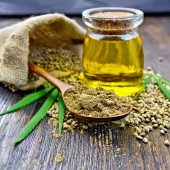What is Fractionation?
Fractionate means to divide or break up; to separate (a mixture) into different portions, especially by a fractional process. In a general sense, fractionation is any process in which a mixture is separated into its different components (fractions).
The term “fractionation” can also be used in the general and common context for any process that may not even involve any phase changes (i.e. – liquids turning into gasses). Orange juice with extra pulp can be considered a mixture that experiences fractionation. The juice from the orange is the liquid and the pulp is the solid material. Due to a difference in density, the solid pulp will sink to the bottom of the jug of juice. The pulp (sediment) resting at the bottom and separating from the juice due to weight and gravity is an example of fractionation. The two separate naturally, but with a good shake, the two components can become a homogenous mixture again.
Virgin oils, also referred to as unrefined, have a tendency to fractionate due to their unrefined nature. Virgin oils can contain particulate matter from the plants in which they were extracted from. This particulate matter is typically denser than the oil, so it can rest at the bottom over time; just like Orange juice with extra pulp!
Fractionation processes, in a more scientific context, are processes of the separation of mixtures (liquids, gasses, or solids) into their components. Fractionated Coconut Oil, also known as Coconut MCT Oil, for example, is a product of fractionating the oil obtained from coconuts. The coconut oil is distilled to separate the Medium Chain Triglycerides (MCT) within the coconut oil, which then creates Fractionated Coconut Oil.
Winterization
Have you ever created your own salad dressing using olive oil and other spices, then refrigerated the mixture to keep it fresh? You may notice the next time you go to eat a salad that your dressing has solidified! Letting it sit until room temperature will slowly warm the oil so it is suitable to pour, but why did the oil solidify in the first place you may wonder? Olive Oil, and many other oils, contains free fatty acids and waxes which can solidify in cold temperatures.
Winterization is a process that involves solvent and cold temperatures to separate lipids (fatty acids) and waxes from the desired oil. It is a refinement technique that removes the material/compounds out of an oil that can solidify. Removing this from an oil keeps the oil in a liquid state even in cold temperatures. Rice Bran Oil is commonly winterized due to its high wax and fatty acid content.
Unrefined and refined oils with high fatty acid contents can be prone to solidifying below room temperature, leading to fractionation once it becomes liquid again. In this case, we recommend warming the oil, by way of placing the container in a warm bath for example, then mixing to correct any fractionation that may have occurred to return to a homogenous state. You then want to quickly cool the material by putting the container in a refrigerator or an environment below room temperature.
We hope all readers found this information helpful! If you have any topics you would like to see us write about, please reach out to marketing@bulknaturaloils.com.





